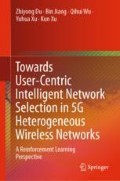Abstract
This chapter studies distributed network selection for multiple user cases with heterogeneous demand. The key challenge is low system efficiency due to user competition. Motivated by the fact that the ultimate goal of communications is to serve users with personalized demand, we introduce a new concept of user demand diversity gain. This gain derives from the elaborate matching between user demand and radio resource, which cannot be directly attained in the existing throughput-centric optimization due to users’ blindness in maximizing throughput. Aiming at obtaining this gain, we propose the user demand centric optimization, where users seek to maximize QoE. To model this problem, we propose a novel game formulation, QoE game. The properties of QoE game and QoE equilibrium and the definition of user demand diversity gain are presented. Two distributed QoE equilibrium learning algorithms, stochastic learning automata (SLA) based algorithm and trail and error (TE) based algorithm, are designed to achieve QoE equilibrium. Simulation results validate the existence of user demand diversity gain and the effectiveness of the proposed learning algorithms in improving the system efficiency and QoE fairness.
Access this chapter
Tax calculation will be finalised at checkout
Purchases are for personal use only
References
Trestian R, Ormond O, Muntean G (2012) Game theory-based network selection: solutions and challenges. IEEE Commun Sruv Tut 14(4):1018–1044
Liu D et al (2016) User association in 5G networks: a survey and an outlook. IEEE Commun Sruv Tut 18(2):1018–1044
Keshavarz-Haddad A, Aryafar E, Wang M, Chiang M (2017) HetNets selection by clients: convergence, efficiency, and practicality. IEEE ACM Trans Netw 25(1):406–419
Zhu K, Niyato D and Ping W (2010) Network selection in heterogeneous wireless networks: evolution with incomplete information. In: IEEE wireless communications and networking conference (WCNC)
Zhu K, Hossain E, Niyato D (2014) Pricing, spectrum sharing, and service selection in two-tier small cell networks: a hierarchical dynamic game approach. IEEE Trans Mob Comput 13(8):1843–1856
Du Z, Wu Q et al (2015) Exploiting user demand diversity in heterogeneous wireless networks. IEEE Trans Wirel Commun 14(8):4142–4155
Deb S, Nagaraj K, Srinivasan V (2011) MOTA: engineering an operator agnostic mobile service. MobiCom (2011)
Perlaza SM, Tembine H, Lasaulce S et al (2011) Quality-of-service provisioning in decentralized networks: a satisfaction equilibrium approach. IEEE J-STSP 6(2):104–116
Rakocevic V, Griffiths J, Cope G (2001) Performance analysis of bandwidth allocation schemes in multiservice IP networks using utility functions. In: Proceedings of the 17th international teletraffic congress (ITC)
Reis AB, Chakareski J, Kassler A et al (2010) Distortion optimized multi-service scheduling for next-generation wireless mesh networks. In: IEEE INFOCOM
Kelly FP (1997) Charging and rate control for elastic traffic. Eur Trans Telecommun 8:33–37
Monderer D, Sharpley LS (1996) Potential games. Games Econ Behav 14:124–143
Milchtaich I (2009) Weighted congestion games with separable preferences. Game Econ Behav 67:750–757
Mavronicolas M, Milchtaich I et al (2007) Congestion games with player-specific constants. In: International symposium on mathematical foundations of computer science (MFCS)
Sastry P, Phansalkar V, Thathachar M (1994) Decentralized learning of nash equilibria in multi-person stochastic games with incomplete information. IEEE Trans Syst Man Cybern B 24(5):769–777
Xu Y, Wang J, Wu Q et al (2012) Opportunistic spectrum access in unknown dynamic environment: a game-theoretic stochastic learning solution. IEEE Trans Wireless Commun 11(4):1380–1391
Pradelski BS, Young HP (2010) Efficiency and equilibrium in trial and error learning. University of Oxford, Department of Economics, Economics Series Working Papers
Coucheney P, Touati C, Gaujal B (2009) Fair and efficient user-network association algorithm for multi-technology wireless networks. In: IEEE INFOCOM
Xue P, Gong P, Park J et al (2012) Radio resource management with proportional rate constraint in the heterogeneous networks. IEEE Trans Wirel Commun 11(3):1066–1075
3GPP TR 36.814 V9.0.0 (2010-03)
How much bandwidth does Skype need? https://support.skype.com/en
Niyato D, Hossain E (2009) Dynamics of network selection in heterogeneous wireless networks: an evolutionary game approach. IEEE Trans Veh Technol 58(4):2008–2017 (2009)
Author information
Authors and Affiliations
Corresponding author
Rights and permissions
Copyright information
© 2020 Springer Nature Singapore Pte Ltd.
About this chapter
Cite this chapter
Du, Z., Jiang, B., Wu, Q., Xu, Y., Xu, K. (2020). Exploiting User Demand Diversity: QoE Game and MARL Based Network Selection. In: Towards User-Centric Intelligent Network Selection in 5G Heterogeneous Wireless Networks. Springer, Singapore. https://doi.org/10.1007/978-981-15-1120-2_7
Download citation
DOI: https://doi.org/10.1007/978-981-15-1120-2_7
Published:
Publisher Name: Springer, Singapore
Print ISBN: 978-981-15-1119-6
Online ISBN: 978-981-15-1120-2
eBook Packages: EngineeringEngineering (R0)

